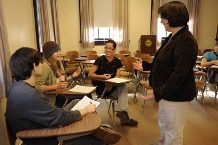Research shows that certain teaching practices improve learning and reduce inequities. Graduate student Eva Gerber explores how one UC Berkeley department is bringing these crucial findings from education journals into classrooms.
By the time that Danielle Spitzer, a fifth-year graduate student in the department of Molecular and Cell Biology (MCB), attended her departmental first-time Graduate Student Instructor (GSI) training, she had already learned about evidence-based pedagogy and was aware of the literature studying the efficacy of teaching strategies. So, she was frustrated that so much of the information given to her and her peers was outdated or debunked.
Spitzer ultimately found like-minded graduate students who were similarly passionate about evidence-based teaching. They observed that MCB graduate students lacked confidence as GSIs, felt inadequately trained, and did not have sufficient knowledge or resources to independently grow as instructors. Together with lecturers Robin Ball and Robert Beatty and with support of David Bilder, then the MCB graduate program’s head graduate advisor, these graduate students sought to establish a pedagogy course for first-time GSIs in the MCB department. After Ball developed a syllabus for a pedagogy course, incorporating input from the graduate students, she piloted the course with a group of volunteers in the fall of 2019. The subsequent year, the course was taught over Zoom to all first-time GSIs. This is the first semester that the pedagogy course, MCB 375, has been implemented in its complete form in person.
Bilder explains that the goal of MCB 375 is “to provide instruction in evidence-based strategies that enhance science education, with the goal of developing teaching skills for PhD student GSIs and improving learning outcomes for their undergraduate students.”
Indeed, according to Spitzer, the course “covers the greatest hits” of biology education research. In five weeks, new GSIs learned about promoting student engagement; facilitating discussions; implementing effective, transparent, and unbiased assessments and grading; designing lesson plans; and encouraging student motivation and self-efficacy.

Each class session began with dedicated time for GSIs to reflect on their teaching the previous week, and GSIs were encouraged to specifically comment on how they brought strategies discussed in the pedagogy course into their classrooms. Next, the class discussed a paper shedding light on the week’s topic. Often, an active learning strategy was implemented to facilitate discussion.
According to Ball, the goals of the course are to provide GSIs with practical skills that they can immediately implement in their classrooms and expose GSIs to biology education research detailing effective teaching strategies. The course emphasizes that teaching can be studied empirically, and that novice educators can draw upon years of research to discern which teaching practices most effectively promote learning and reduce inequities.
As Ball explains, “in the future, if you are teaching your own class and you do have something that you have struggled with, you can go to the literature. We know how to do that for our scientific research, and I want you to know that you can also do that for education.”
Moreover, discussions between GSIs about their trials and successes reinforced the idea that being an effective teacher is a learned skill rather than an innate proclivity. By providing GSIs with evidence-based teaching resources and fostering a supportive community, Ball hopes that first-time GSIs will feel confident bringing effective teaching strategies into the classroom.
Although a survey to test the efficacy of MCB 375 is ongoing, anecdotally, new GSIs have found the course relevant and helpful. Kristna Boyko is a second-year student in Jamie Cate’s lab, and she is GSI-ing for MCB 102: Survey of the Principles of Biochemistry and Molecular Biology. In addition to providing her with concrete techniques to increase student talk, exercises to promote active learning in her discussion sections, and practice designing assessments, MCB 375 has given Boyko a more expansive and student-centered understanding of what it means to be a teacher.
“I think it opened my eyes to the idea that teaching is not just giving students information,” says Boyko. Rather, “it’s helping them understand the information and taking that information to the next level.” Boyko implements this new knowledge in her discussion sections by organizing learning activities that encourage student talk.
Indeed, although she didn’t initially feel prepared to be an effective GSI, Boyko has had a positive experience and has gained an appreciation for the potential impact evidence-based teaching strategies can have on students.
Trinity Cookis, a second-year student co-advised by Eva Nogales and Robert Tijan, is currently GSI-ing for MCB 110: Molecular Biology: Macromolecular Synthesis and Cellular Function. Like Boyko, Cookis has integrated evidence-based learning strategies she learned about in MCB 375 into her teaching. For example, she relies upon evidence-based theoretical frameworks to write questions for her students’ quizzes and implements exercises to promote student talk during discussion sections. Furthermore, the course reinforced the idea that becoming better at teaching is an ongoing and iterative process, and she is now aware of biology education research that she can draw upon to improve as an instructor.
Instructors and GSIs alike recognize the importance of evidence-based teacher training for graduate students interested in pursuing academic careers, and they also emphasize that skills learned through GSI-ing can be transferred to scientific careers outside of academia. However, Spitzer points out that “regardless of whether or not you plan to do this in ten years, you do have to do this for two years.” Therefore, GSIs have an “obligation to the undergraduates that you teach.”
For Spitzer, effective teaching “is very obviously tied up in equity. If we want to be serious about living in a more just world, what can we do with the jobs that we are already doing? You have a job, and you can do that job differently, and the result could be more inequality or less: which one do you want to do?”